Two-day IOS National Conference on “Allama Habibur Rahman Azmi: Life and Contributions”
July 6-7, 2019 at the Constitution Club of India, New Delhi
تقرير المؤتمر الوطني حول حياة العلامة الأعظمي، نشرت في مجلة البعث الإسلامي، لكناؤ، الهند

L-R: Prof. Ishtiyaque Danish, finance Secretary, IOS; Prof. Z.M. Khan, Secretary General, IOS; Maulana Mohammad Abdullah Mughesi, president, All India Milli Council; Maulana Saeedur Rahman Azmi, principal, Darul Uloom Nadwatul Ulema, Lucknow; Dr. Mohammad Manzoor Alam, chairman, IOS; Maulana Syed Mohammad Wali Rahmani, general secretary, All India Muslim Personal Law Board; Prof. A. R. Momin, former professor of sociology, University of Bombay and editor, IOS Minaret (a web journal); Dr. Masood Ahmad Azami, Grandson of Allama Habibur Rahman Azmi
A two-day national conference on “Allama Habibur Rahman Azmi: Life and Contributions” was organised by the Institute of Objective Studies on July 6-7, 2019 at the Constitution Club of India, New Delhi. The conference discussed different aspects of life and works of the Islamic scholar of the twentieth century.
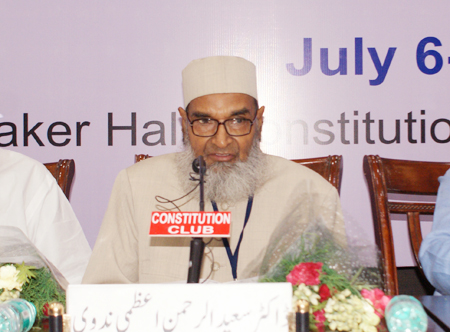
Inaugurating the conference, Maulana Saeedur Rahman Azmi, principal, Darul Uloom Nadwatul Ulema, Lucknow, praised the chairman, IOS, Dr. Mohammad Manzoor Alam, for remembering Allama Habibur Rahman Azmi, whose works made a mark not only in India, but also the Arab world as one of the scholars of Hadith in the Islamic world.
Recalling Allama Azmi’s services, he said Maulana Habibur Rahman started his career as a teacher of Hadith at Darul Uloom at Mau in UP, where he spent four years. He was endowed with the rare distinction of profound knowledge of Hadith and its authentic sources. He was a living embodiment of Islamic scholarship and research. He helped every scholar who visited him to seek his guidance on the veracity and interpretation of some Hadith.
His life became a resource for a generation of ulema and interpreters of Hadith. He said that whoever came to the maulana for clarity on an issue with regard to Hadith returned fully satisfied. He described the maulana as a mobile school of Hadith. His term as Amir-ul-Hind afforded him an opportunity to undertake a countrywide tour. During this tour, he met a cross-section of people cutting across schools of jurisprudence and earned their appreciation and respect. His organising capabilities came to the fore when he was elected as a member of Jamiatul Ulema-i-Hind under the leadership of Sheikhul Hind, Maulana Syed Husain Ahmed Madani.
He became so popular that some Muslims joined the organisation due to him. He had close association with the top ulema of his times, including Maulana Ashraf Ali Thanvi. He was in regular correspondence with the latter on matters of Islamic jurisprudence and Shariah. This led him to be nominated as member and chairperson of several academies and institutions of learning. He was never found wanting whenever the ulema faced a challenge. It was his life’s mission to promote the learning of and research on the Quran and the Hadith, and strict adherence to the Sunnah. The maulana also served as a member of the Uttar Pradesh state assembly for one term and received an award from the President of India in recognition of his contributions, he added.
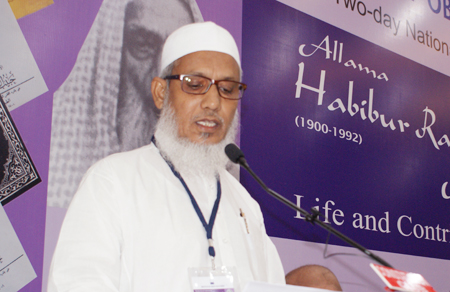
Presenting a profile of Allama Habibur Rahman Azmi, his grandson, Dr. Masood Ahmad Azami, held that the maulana belonged to Mau, a town in eastern UP, known for its handloom industry. Maulana Habibur Rahman lived a frugal life, but his work is highly valued in the subcontinent, Egypt, Hejaz and Iraq. He received elementary education at home and in his home town, and went to Bahadurganj (District Ghazipur), Gorakhpur, Banaras, and Darul Uloom, Deoband (all in UP). He learnt the finer points of the Quran and Hadith from Maulana Karim Baksh who was then the principal and Sheikh-ul-Hadith of Darul Uloom, Mau.
He said that the maulana’s life was fully devoted to the study, teaching and dissemination of religious texts. He continued this work till his death. He wrote dozens of books in Arabic and Urdu which proved his erudition and deep knowledge of Islam.
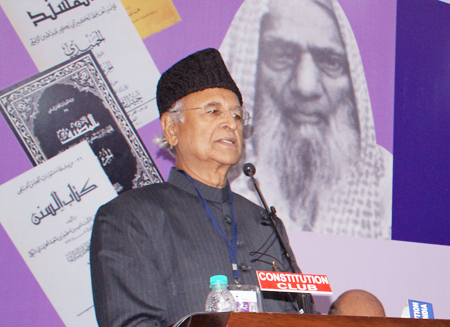
In his keynote address, Prof. A. R. Momin, former professor of sociology, University of Bombay and editor, IOS Minaret ( a web journal), remarked that Islam was the only religion in the world which preserved its faith, worship, law, values, etiquette, manners and morals throughout its history of 1400 years. This historical continuity and the belief in Oneness of God was deeply rooted in the Quran and Sunnah. The ulema unceasingly strived to preserve this precious heritage by transferring it from one generation to another. They displayed rare interest in it and made extraordinary effort in teaching of the Quran and Hadith.
He said that Muslims should be highly indebted to their forefathers and remember their services by praying for their high place in heaven. He warned that those who forgot their forefathers were destined to pale into oblivion. Referring to Western orientalists’ claim that the collection and writing of the Quran and Hadith began much after the death of Prophet (PBUH) in the third century A.D., and thus its genuineness was not above board. Prof. Momin said, our forefathers who now lay buried had already disproved their theory by forcefully arguing with unimpeachable evidence that the collection and writing of both the Quran and Hadith had begun during the lifetime of the Prophet (PBUH) himself. The late Dr. Mohammad Mustafa al-Azmi wrote that about 2.5 lakh complete and incomplete manuscripts of the Quran had been preserved. Most of them belonged to early first and second centuries A.D., he noted. A number of Indian and Arab ulema and scholars of Hadith benefited from his deep knowledge of the subject. Maulana Abul Ma’asir’s worldwide popularity was due to his service of Islam, and above all, he did it for the pleasure of Allah. He said that Allama Habibur Rahman Azmi secured photocopies and microfilms of rare books on Hadith, and compared them with other manuscripts in order to test their genuineness. One of his noticeable works was to take out different manuscripts and present them by using modern methodology.
These books remained inaccessible to the ulema and interpreters of Hadith for several centuries. His devotion to research could be illustrated by the fact that he discovered the difficult interpretation of Imam al-Thanvi at the young age of 29 years. He observed that Maulana Abul Ma’asir was deeply imbued with the knowledge of Hadith and this was proved by his works in which he differed with Imam Bayhaqi, Imam Dar Qutni, Hafiz Ibn Hajal al-Asqalani and Hafiz Hashmi on several points. Dr. Mohammad Hamidullah, Dr. Fuat Sezgin, Sheikh Mohammad Fuad Abdul Baqi and Allama Habibur Rahman Azmi held a balanced view of the researches of orientalists. He said that Maulana Abul Ma’asir’s opinion about the works of orientalists exemplified his sense of accommodation, fairness, broad vision and a balanced eye. One of the most noteworthy contributions of the maulana was his work on Islamic International Law. It was Dr. Hamidullah who proved that the scholar of international law, Hugo Grotius was not the first writer on the subject. It was the Muslims who first codified international law, he added.
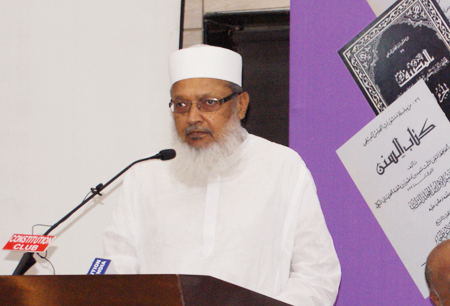
Speaking as a guest of honour, Maulana Syed Mohammad Wali Rahmani, general secretary, All India Muslim Personal Law Board, pointed out that Hadith was Maulana Habibur Rahman’s field of writing and research. He said that it was the fourth Caliph of Islam, Hazrat Ali (RA) who first collected and compiled the Ahadith. He was followed by another companion Hazrat Abu Huraira (RA). Thereafter, the compilation of Ahadith received a boost, he concluded.
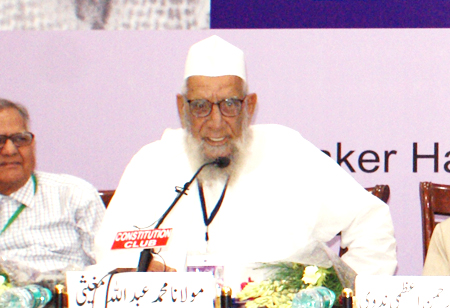
Another guest of honour, Maulana Mohammad Abdullah Mughesi, president, All India Milli Council, explained that Hadith was the interpretation of the Quran, adding that an aalim was dispatched to Thane in India to spread the message of Quran and Hadith by the second Caliph of Islam, Hazrat Omar Farooq (RA). This showed that the Muslims landed on Indian shores some 1400 years ago to teach the message of Hadith. He said that the contribution of Shah Waliullah Mohaddis Dehlavi to the teaching of Hadith could not be underestimated. But, it was his son, Shah Abdul Aziz Dehlavi, who formally started the facilities for the teaching and study of Hadith. Maulana Abul Ma’asir was last such Islamic scholar who was conferred the title of Amir-ul-Hind. Hazrat Abu Huraira (RA) had memorised as many as 5,000 Ahadith and the knowledge of Hadith would continue to flourish till the Day of Judgment, he said.
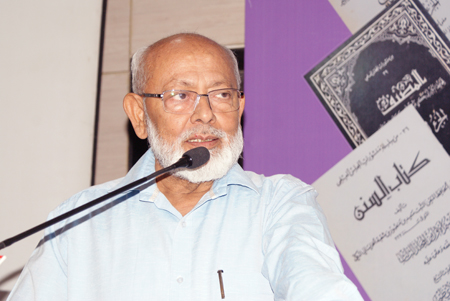
Delivering the presidential address, the chairman, IOS, Dr. Mohammad Manzoor Alam, announced that two seminars – one national and the other international – would henceforth be organised by the Institute every year. He added that a function on the life and contribution of Prof. Fuat Sezgin, an eminent historian of science in the world and heading figure of scholarship in Islamic science and civilisation, would be organised on December 21-22, 2019 at New Delhi. He also announced that if the manuscripts of Habibur Rahman Azmi’s unpublished works were made available to the IOS, they would be published by it. Commenting on the contributions of Maulana Abul Ma’asir Allama Habibur Rahman Azmi, he said that besides being an aalim of Islam par excellence, he was a gifted writer and established himself as an authority on the interpretation of Hadith. While he headed the seat of Hadith at Darul Uloom Nadwatul Ulema in Lucknow, he served as a member of the advisory committee of Darul Uloom, Deoband. He had the distinction of being a student of Mohaddis-e-Asr, Allama Anwar Shah Kashmiri and Sheikh al-Islam, Allama Shabbir Ahmad Usmani as far as the learning of Hadith was concerned. Dr. Alam noted that due to his works of rare scholarship, Maulana Azmi was counted among a few mohaddisin of the 20th century for exceptional scholarship. Books like Musnad Humaidi, Kitab az-zuhd, Kashful Asrar and Musnad Ahmad would survive to illuminate the Ummah till the Day of Judgment and the name of Allama Habibur Rahman Azmi would be remembered in one way or the other. He said that a fitting tribute to the maulana would be to carry forward his legacy for the benefit of the younger generation of the ulema who could make best of both the worlds, he concluded.
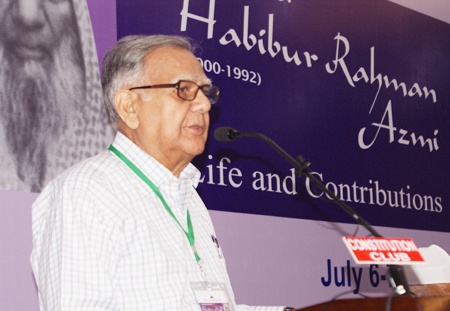
Earlier, the conference got off to a formal start by the recitation and Urdu translation of a Quranic verse by the Secretary, Idara Umoor-e-Masajid, Maulana Abdullah Tarique. This was followed by the introduction of the theme and the IOS by its Secretary General, Prof. Z.M. Khan. He said that the Institute tried to remember those who contributed to Islamic research by organising programmes in their memory. The IOS focused more on research than criticism. Referring to research, he stated that those desirous of research were asked to present their topic of proposed research to get financial assistance from the IOS. “In case of any difficulty, we would ask our experts to help him”, he said. The IOS had completed 33 years of its existence and it had always been its endeavour to engage those who were willing to undertake research. The IOS also got them trained by its panel of experts. Besides, national and international conferences seminars, symposia and workshops were organised at regular intervals. The IOS also took help from various institutions while organising events in other towns of the country. “At the IOS, we believe in extending help to others and seeking help from other institutions and organizations”, he said. The IOS had been publishing research books and translations of standard works. This became possible due to the strides made by technology. The IOS also got surveys done for generating data on socio-economic status of deprived sections, particularly Muslims. Five regional centres of the Institute had been functioning in various towns of the country. These centres were provided inputs like funds and experts to make them self-sustaining. Usually, the Institute organised interactions and programmes on every fifteenth day.
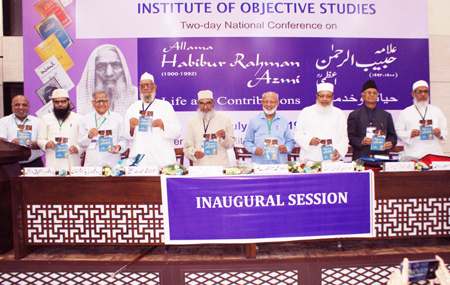
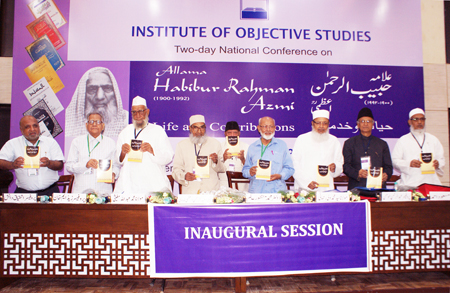
He laid stress on taking the translation work forward. One of the highlights of the function was the release of the book titled Dr. Mohammad Hamidullah ka Ilmi Warsa aur Uski Asri Manviyat, edited by Prof. Mohsin Usmani, by Maulana Dr. Saeedur Rahman Azmi and another book titled Alam-e-Islam Ka Bemisaal Mohaqqiq: Dr. Fuat Sezgin, edited by Shah Ajmal Farooq Nadwi, by Maulana Mohammad Abdullah Mughesi. The proceedings of the inaugural session were conducted by the Prof. Ishtiyaque Danish, finance Secretary, IOS, and a vote of thanks was proposed by Shah Ajmal Farooq Nadwi, in-charge, Urdu Section, IOS.
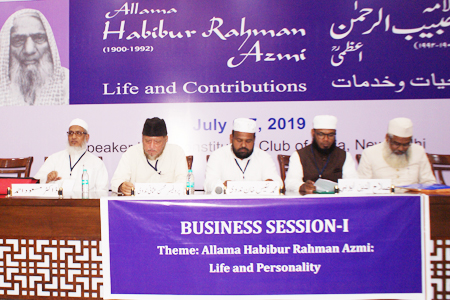
Business Session-I
The inaugural session was followed by the business session-I on “Allama Habibur Rahman Azmi: Life and Personality”, chaired by Prof. Mohsin Usmani, former head, deptt. of Arabic, The EFL University, Hyderabad. The session began with the message from Maulana Mohammad Rabey Hasani Nadwi, Rector, Nadwatul Ulema, Lucknow, who could not make it to the conference on account of his ill-health, which was read out by Shah Ajmal Farooq Nadwi. His message centered on “Mohaddis-e-Jaleel, Qaid-e-Millat Maulana Habibur Rahman Azmi: Ta’assurat wa Moshahadaat.” Mufti Arshad Farooqi from Deoband was the first speaker of the session, followed by Dr. Masood Ahmad Azmi, grandson of Maulana Habibur Rahman Azmi, who threw light on “Allama Azmi ki shakhsiyat ke kuchh numaya pehlu.” While Mohammad Nafees Khan Nadwi, research fellow, Daar-e-Arafaat, Raebareli, presented his paper on “Allama Habibur Rahman Azmi: Jame kamalat shakhsiyaat”, Mohammad Salahuddin, research scholar, MANUU, Hyderabad spoke on “Ilmey Hadees mein Allama Habibur Rahman Azmi ki khidmaat- Eik tahqeeqi jayeza.”
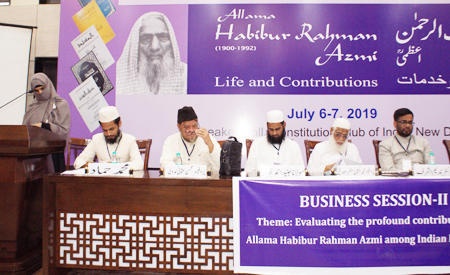
Business Session-II
The second session devoted to “Evaluating the profound contributions of Allama Habibur Rahman Azmi among Indian Mohaddisin”, was chaired by Prof. Mohammad Yaseen Mazhar Siddiqui, former director, Idaara Uloom-e-Islamia, Aligarh. While Prof. Mohsin Usmani discussed “Bisween sadi mein Hindustan mein khidmat-e-Hadees ka manzarnama aur Maulana Habibur Rahman Azmi”, Dr. Nadeem Ashraf, asstt. professor, deptt. of Sunni Theology, AMU, Aligarh focused on “Kitabuz Zuhd ki tehqeeq-o-taleeq aur Maulana Habibur Rahman Azmi’. Dr. Tamanna Mobeen Azmi, guest faculty, deptt. of Islamic Studies, JMI, New Delhi, presented the paper on “Abul Maasir Maulana Habibur Rahman Azmi bahaisiyat muhaddis (Nusratul Hadees ke hawale se)” followed by Junaid Ahmed Qasmi, teacher, Jamia Rehmani, Khanqah Munger, who spoke on “Maulana Habibur Rahman Azmi: Ilm-e-Hadees ke bab mein imtiyazi khidmaat.” Mohammad Hammad, research scholar, deptt. of Sunni Theology, AMU, Aligarh, was the last speaker of the session who focussed on “Maulana Habibur Rahman Azmi aur unki khidmaat-e-Hadees, tehqeeqat-o-taleefat ke tanazur mein.”
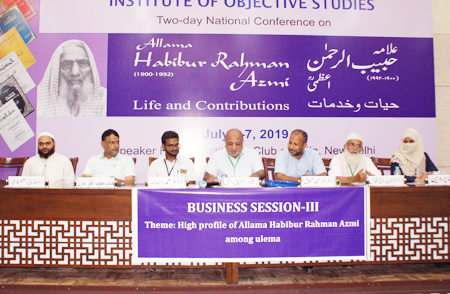
Business Session-III
This was the last session of the day with Prof. Ishtiyaque Danish in the chair. Devoted to the theme “High profile of Allama Habibur Rahman Azmi among ulema”, the session had Dr. Abu Sahban Ruhul Quds Nadwi, lecturer, faculty of Hadith, Nadwatul Ulema, Lucknow, as its first speaker. He focused on “Maulana Habibur Rahman Azmi key tehqeeqi asaar per eik nazar”. He was followed by Dr. Khursheed Afaq, guest faculty, deptt. of Islamic Studies, JMI, New Delhi, who spoke on “Uloom-e-Islami mien Maulana Habibur Rahman Azmi ki khidmaat aur unke afkaar ka tanqeedi wa tajziyati Muta’ala.” While Dr. Mohammad Usama, guest faculty, deptt. of Islamic Studies, JMI, New Delhi, threw light on “Maulana Habibur Rahman Azmi ki baaz nadir tehqeeqat, Islami shakhsiyaat ke hawale se”, Md. Farooque Azam, PhD. scholar, JNU, New Delhi, touched upon “Allama Habibur Rahman Azmi aur Urdu shayari” Ms. Roohnuma Parveen, research scholar, deptt. of Islamic Studies, AMU, Aligarh, presented a paper on “Maulana Habibur Rahman Azmi aur tasawwuf.” The last speaker of the session was Dr. Mujeeb Akhtar Nadwi, asstt. professor, deptt. of Arabic, University of Delhi, who focused on “Mohaddis-e-Kabeer Abu Ma’asir Hazrat Maulana Habibur Rahman Azmi bahaisiyat shayer”.
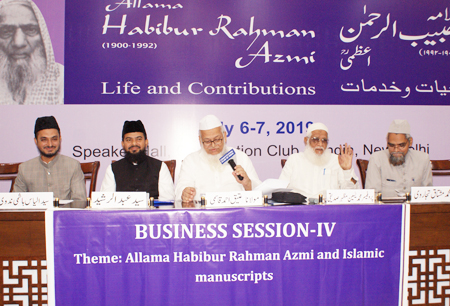
Business Session-IV
The second day of the conference began with fourth business session, which focused on “Allama Habibur Rahman Azmi and Islamic manuscripts”. Maulana Ateeq Ahmed Qasmi Bastavi was in the chair. The first speaker of the session was Prof. Mohammad Yaseen Mazhar Siddiqui who spoke on “Maulana Habibur Rahman Azmi ki tadveen Musannaf Abdur Razzaq”. He was followed by Dr. Mushtaq Ahmed Tijarwi, asstt. professor, deptt. of Islamic Studies, JMI, New Delhi, who centered his talk on “Musnad Humaidi ki tahqeeq ka tajziyati mutaala”. Dr. Syed Abdur Rasheed, asstt. professor, deptt. of Islamic Studies, Aliah University, Kolkata, was the third speaker at the session who shared his views on “Makhtootat-e-Hadees ki tehqeeq mien Maulana Habibur Rahman Azmi ka manhaj aur uski khusoosiyaat”. Ilyas Hashmi, research fellow, Dairatul Maarif, Hyderabad, was the last speaker, who talked on “Islami makhtootat: Muhaddis-e-kabeer Allama Habibur Rahman Azmi aur faqeehud dehr Allama Abul Wafa Afghani ki muraslat ke hawale se.”
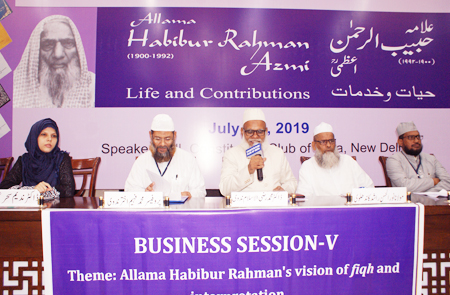
Business Session-V
Chaired by Dr. Raziul Islam Nadwi, Secretary, Jamat-e-Islami Hind, the fifth session was devoted to “Allama Habibur Rahman’s vision of fiqh and interpretation”. Prof. Mohammad Faheem Akhtar Nadwi, deptt. of Islamic Studies, MANUU, Hyderabad, who initiated the discussion, spoke on “Maulana Habibur Rahman Azmi ki fiqhi wa ijtihadi Baseerat: Eik jaizah.” He was followed by Dr. Kamal Ashraf Qasmi, asstt. professor, deptt. of Sunni Theology, Aliah University, Kolkata, who discussed “Allama Habibur Rahman Azmi bahaisiyat faqeeh”. Dr. Nadeem-e-Sahar Ambareen, guest faculty, deptt. of Islamic Studies, JMI, New Delhi, focused on “Maulana Habibur Rahman Azmi aur masla-e-kifaat.” Maulana Noorul Hasan Rashid Kandhalwi, director, Mufti Ilahi Bakhsh Academy, Kandhla, also spoke on the subject.
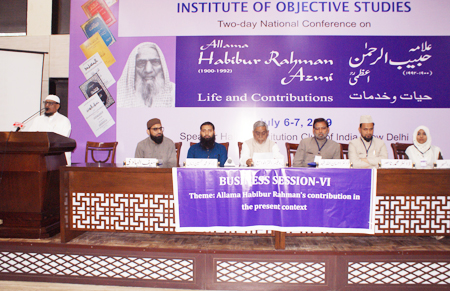
Business Session-VI
Chaired by the Prof. Akhtarul Wasey, president, Maulana Azad University, Jodhpur and professor emeritus, Islamic Studies, JMI, New Delhi, the sixth session focused on “Allama Habibur Rahman’s contribution in the present context.” The talk, initiated by Dr. Ehsanullah Fahad, asstt. professor, deptt. of Sunni Theology, Women’s College, AMU, Aligarh, was focussed on “Fitna-e-Inkaar-e-Hadees aur Maulana Habibur Rahman Azmi”. While Dr. Najmus Sahar, asstt. professor, deptt. of Islamic Studies, Jamia Hamdard, New Delhi, presented a paper on “Islam mein Ustad ka maqaam wa martaba Maulana ki taleef Husn-e-Adab aur iski ahmiyat key tanazur mein.” Dr. Mohammad Nasir, asstt. professor, deptt. of Sunni Theology, AMU, Aligarh, spoke on “Allama Habibur Rahman Azmi ki tasneefi khidmaat ki asri manwiyat.” Dr. Mohammad Tahseen Zaman, guest faculty, deptt. of Islamic Studies, JMI, New Delhi, discussed on “Maulana Habibur Rahman Azmi aur hujjiyat-e-hadees (Nusratul Hadees ke hawale se).” Saif ul Hadi, lecturer, Usul al-Hadith, Indian Institute of Islamic Studies, New Delhi, who talked on “An appraisal of Muhaddith-e-Kabeer Maulana Habibur Rahman Azmi’s endeavors in answering modernist and orientalist scepticism of Hadith: Gleanings of Methodological principles from select academic writings”. The last speaker of the session was Shaikh Dr. Hashim al-Ahdal, former professor at Umm al-Qura University, Makkah, Saudi Arabia.
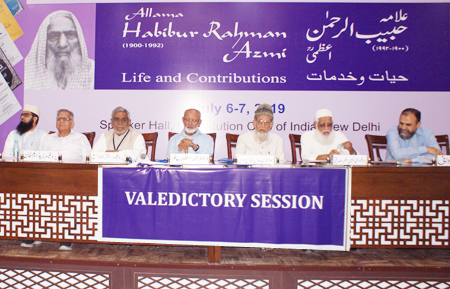
Valedictory Session
In his valedictory address, Prof. Akhtarul Wasey, praised Dr. Mohammad Manzoor Alam for refreshing the memories of those scholars who contributed to the study of the Quran, Hadith and Islam by organising conferences, seminars and symposia without having regard to a particular school of thought. Referring to Azamgarh as a place where illustrious sons like Allama Shibli Noumani, Maulana Habibur Rahman Azmi and Mufti Abdul Mannan were born and made it their field of work relating to Islamic learning, he said that he was fortunate to study there. Maulana Habibur Rahman Azmi was rated among the top ulema of the 20th century and a great scholar of Hadith. He did not confine himself to the study of Islam and research on the Quran and Hadith, but also served as a member of the UP state legislative assembly from 1952-1957. Prof. Wasey called for further study of his tenure as an MLA. While disfavouring obsession with personality cult, he pleaded that one should be given his due.
Launching a scathing attack on casteism, he disagreed with the views held by Maulana Ahmad Raza Khan Bareilvi and Sir Syed Ahmad Khan in this connection. Instead, he said, the dignity of labour should be upheld. If one believed in Allah and His Prophet (PBUH), colour and geographical boundaries did not matter, he added.
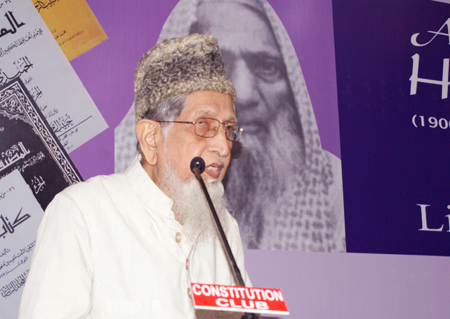
Speaking as a guest of honour, vice-president, All India Muslim Personal Law Board, Maulana Syed Jalaluddin Omari hailed the conference as refreshing the memory of Allama Abul Ma’asir Habibur Rahman Azmi. Calling the address of Prof. Momin superb, he said that Maulana Mughesi brought to light several aspects of Maulana Habibur Rahman Azami’s multi-faceted personality. Holding that the maulana had a broad vision on Hadith, and his works on it were of so high standard that dozens of doctorates could be awarded to researchers. He described the maulana as the uncrowned prince of the kingdom of knowledge of modern times. He inspired the younger generation of the ulema to go deeper into the study of Hadith. His aversion to money could be understood in terms of the fact that he refused to accept a royalty of Rs. 16 lakh for one of the books he wrote.
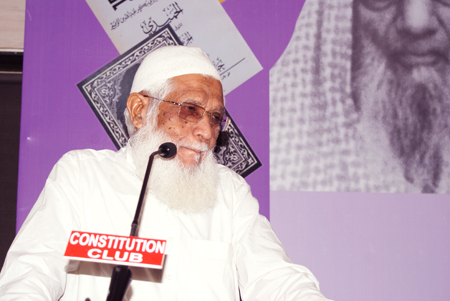
Prof. Mohammad Yaseen Mazhar Siddiqui, in his speech as another guest of honour, said that the maulana was shamsul ulema (sun among the ulema). His work on Islamic caliphate was also significant. The relevance of his works in today’s context lay in the application of appropriate research methodology. Commenting on the maulana’s writings on social issues of Muslims, like talaq and insurance, he said that Muslims appeared to be influenced by the Western culture. He called for distinguishing between the real Islam and the Islam practised by a maulvi.
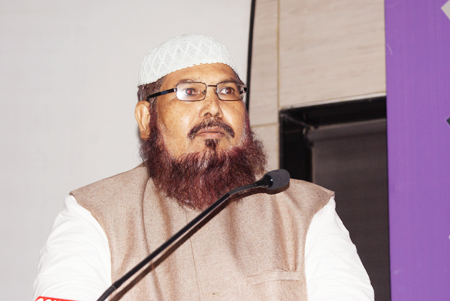
Maulana Abdul Hameed Noumani, secretary general, All India Muslim Majlis-e-Mushawarat, held that a big debate on the relevance of Maulana Habibur Rahman Azmi’s work in the present context was indisputable. Comparing the historicity of the Quran with books like Vedas, Puran and the Ramayana, he said that while the hand-written texts of the former are still available, no such record exist in the case of the latter. Expressing pleasure over the conference, he said that one could learn a lot from Maulana Azmi’s works, particularly those relating to Muslim personal laws. Dr. Masood Ahmad Azami also spoke on various aspects of the Allama’s personality.
In his presidential address, Dr. Mohammad Manzoor Alam, assured that the IOS would try to give a practical shape to all suggestions received at the two-day conference. He said that the idea behind such programmes was IOS bid to bring to light the scholarly legacy of great men. Arguing that divergence of opinion should not be taken to the level of stiff opposition, he emphasised that Muslims should make difference of opinion public. Muslims should also highlight the difference of opinion on various issues at the international level from different angles. He announced that the IOS would award scholarships to researchers desirous of doing research on Maulana Habibur Rahman Azmi and enrolling themselves as Ph.D. scholars. He also offered to give financial support and other facilities to those who submitted a project to the IOS on the study of Hadith in modern context. He invited the translators to come forward and take up the translation of books published by the IOS, in 18 languages. He also announced that important voluminous books would be published in an abridged form and anyone interested in undertaking the work was welcome. He would be paid for it, he concluded.
A 7-point resolution unanimously adopted at the concluding session, was read out by Prof. Z.M. Khan. The resolution read:
1. Today, it is being strongly felt that the series of researches on eminent ulema and scholars undertaken by the IOS, should be carried on unhindered. Every possible effort should be made to give a fillip to it.
2. Work on the problems of the minorities should be taken up on a big scale in the light of the collected fatawas (religious decrees) of Indian ulema.
3. Complete lists and calendars based on the selected subjects of ulema and their life and contributions should be prepared.
4. Efforts should be made to present the current issues at its functions from religious and ideological point of view. The efforts of the IOS in this connection have been noteworthy. Hopefully, the Institute would continue to do this in future as well.
5. Efforts should be made to harmonise modern knowledge and religious studies on intellectual and ideological foundations, so that the latest means could be employed in research on old texts. Endeavours should also be made to mobilise general opinion in favour of it.
6. Sincere efforts should be made to publish unpublished manuscripts of the works of Maulana Habibur Rahman Azmi.
7. Maulana Azmi’s complete biography should be written in Arabic language in order to acquaint Arab ulema with his contribution to Islamic studies.
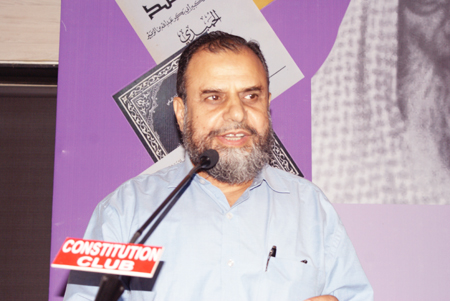
The conference came to a close with a vote of thanks by the vice-chairman, IOS, Prof. M. Afzal Wani.
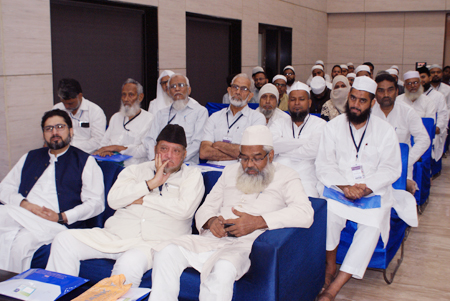
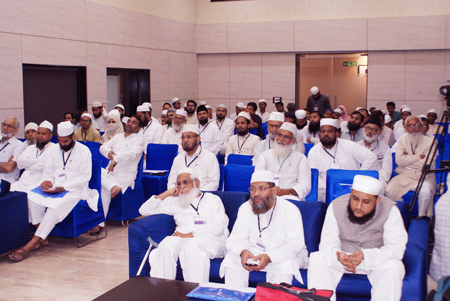
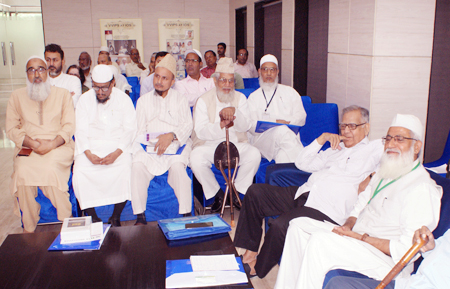
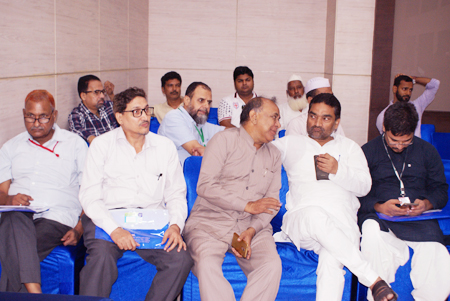
Press Coverage
|